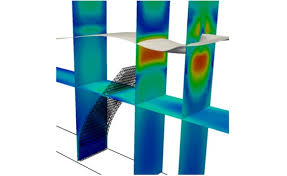ME 6106 - Computational Structural Dynamics

Instructor
Prof. Salil S. Kulkarni
Section
The course has only one section - No such division of S1 or S2
Semester
Spring’19
Course Difficulty
Medium
Time Commitment Required
Medium
Motivation to take this course
I was interested in the field of dynamics and structural vibration and this course covers some fundamental topics in this field.
How strongly would you recommend someone to take this course?
Grading
Grading was strict. Statistics from ASC: AA-1, AU-2, BB-3, CC-1, DD-2.
Attendance Policy
The instructor does not mention anything about DX grade but suggests everyone punch biometric in every class. So it is suggested to maintain an attendance of a minimum 80%
Pre-requisites
This course will require using some concepts previously taught in MA 106, MA 108, MA 214, ME 201, ME 202, and ME 316. You will have to code in MATLAB/Octave for the course project and in some exams.
Evaluation Scheme and Weightage
2 quizzes, midsem, endsem and a course project
Topics Covered in the Course
- Brief Review of the Finite Element Method for dynamic problems and vibrations of multi-degree freedom systems, both undamped and damped
- Solution methods for eigenvalue problems
- Sensitivity of eigensolutions to model parameters
- Dynamic reduction and substructuring – static condensation, component mode synthesis, domain decomposition methods
- Time integration algorithms – single step, multistep: stability and accuracy analysis
Mechanism of Instruction and Teaching Style
The instructor will extensively use the blackboard for teaching this course. Students are expected to take notes. Lecture slides are not provided. The instructor has excellent command over the subject. Discussion on the concepts being taught in the class is encouraged. This plays a crucial role in understanding the subject.
Assignments and projects in the Course
Students can decide their own course projects and discuss them with the instructor or can request the instructor for a problem statement to work upon. Good amount of learning from the course happens through the course project. You will have to code for these projects in MATLAB/Octave and prepare a report. The instructor provides guidelines for these reports.
Exams
For all the exams: Questions asked in the exam are an extension of the concepts and examples discussed in the class and hence are not very difficult to understand. Being able to solve all the questions in the given time can be challenging. Quiz 2 and Endsem: Use of laptops was required. Octave was used as a calculator.
References
The class notes, if written well, are sufficient.
Importance of Course
This course will aid in building the foundation for students who plan to work or pursue research in computational mechanics, finite element analysis, and structural design.
Anything else relevant to the course
In summary, this course is focused more on applications of frequently used concepts in control systems than dealing with the mathematical depth of it. One should not take this course if they are expecting to study a rigorous control theory. It is also advised that students should ask the professor how is he going to manage the course in the coming given the current situation and inclination of the course.
Review by: Dhananjay Tiwari